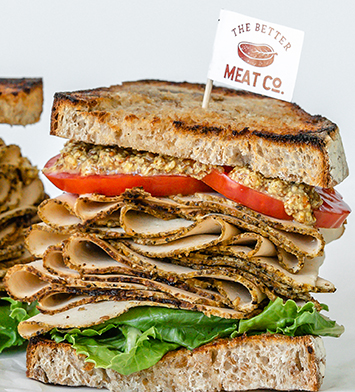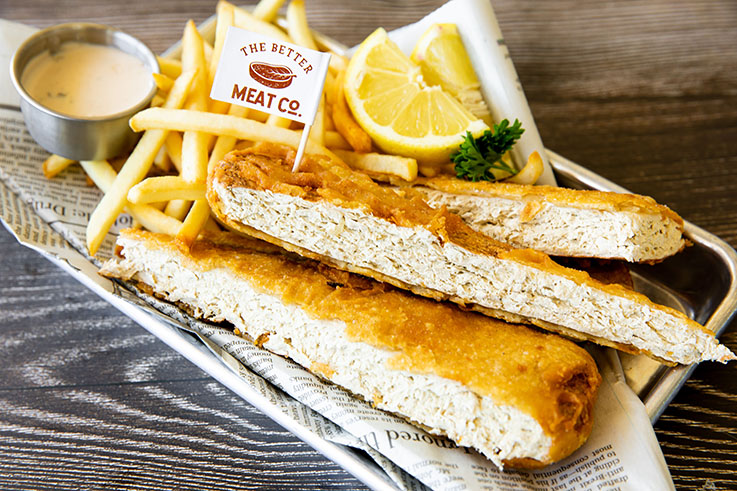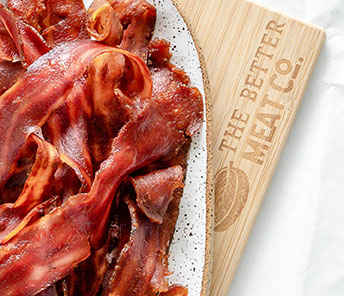

Protein Pioneer: Paul Shapiro
Driven by a life-changing experience three decades ago, Paul Shapiro transitioned from animal advocacy to innovation in sustainable meat alternatives. As the founder of The Better Meat Co., he is now on a mission to transform our food system through mycoproteins, merging compassion with cutting-edge technology for a better future
What can you remember from September 1993? Not much, probably – after all, 31 years is one hell of a long time ago! Thanks to the internet, though, a quick surf reveals that, in sports, Pete Sampras won his second US Open tennis title (Steffi Graf clinched the women’s), and Alain Prost won his fourth F1 World Drivers’ Championship. In entertainment, The X Files TV series debuted on Fox, and Frasier on NBC. In politics, the then Israeli Prime Minister Yitzhak Rabin shook hands with PLO leader Yasser Arafat at the White House, while in Russia President Boris Yeltsin suspended parliament, in doing so triggering the Russian constitutional crisis.
The Better Meat Co.’s Paul Shapiro, though, recalls September 1993 for a very different reason. “My decision to become a vegan was primarily driven by a deep concern for animal welfare,” he says of that life-changing decision more than three decades ago. His lifestyle change was spurred in part by a friend showing him a disturbing video about factory farming practices. That VHS tape – a “relic from the pre-internet era”, he says, for the benefit of our younger readers – showed footage that was so shocking that the 14-year-old Shapiro couldn’t imagine any animal, including his own pets, enduring such cruelty.

Reflecting on his past and the significance of that video nasty, Shapiro reports that he initially became a vegetarian. Subsequently, through volunteering at animal protection groups, he learned about veganism. “I must admit I was skeptical at first, and worried about nutritional deficiencies. But then I discovered that Carl Lewis – one of the world’s greatest athletes – was also a vegan.
“My parents were initially concerned about my health and insisted I see a nutritionist,” he adds. Fortunately for Shapiro and all the animals he hasn’t eaten since, the nutritionist he found turned out to be a vegan herself. “Inspired by her guidance and my newfound passion for animal welfare, I dedicated my life to advocating for animals and finding ways to reduce our reliance on them as a food source.”
A new approach to meat
In 1995, Shapiro founded Compassion Over Killing as a high-school club and built it into a national organization over the next decade. Staying in the field, he moved to The Humane Society of the United States in 2005, where he would remain until 2018. Around 2015-2016, though, the impassioned Shapiro began to question whether those lobbying efforts were sufficient. “Although I believed in the importance of animal advocacy, I wondered if emerging food technology might offer a more effective solution,” he says. “The rise of companies such as Beyond Meat and Impossible Foods made me contemplate historical precedents. For centuries, animals were exploited for various products, such as whale oil, horsepower, and goose feathers. These industries were eventually replaced by more efficient alternatives. I wondered if food technology could potentially do the same for animal agriculture.”
Determined to make a difference, Shapiro decided he would write a book – Clean Meat: How Growing Meat Without Animals Will Revolutionize Dinner and the World. “My goal was to inspire others with the necessary expertise to pursue this path,” he continues. And much to his surprise, that book was purchased by Simon & Schuster. Published in 2018, Clean Meat exceeded Shapiro’s expectations. “It opened doors for me, and I faced a choice: continue writing about those who I thought might solve this problem or become one of them. As I researched and wrote, it became clear that the leaders in this field were not superhuman. They were ordinary people with determination and vision. I decided to take a leap of faith and try my hand at creating a sustainable alternative to animal-based meat. So, at the end of my book tour in 2018, I embarked on this new journey.
“But I thought I was just a dumb lobbyist – I’m no food scientist or microbiologist,” Shapiro laughs. “I didn’t have an MBA or millions of dollars to invest. So, a few friends of mine – including a food scientist and funnily enough a Harvard-educated MBA – decided to leave our lives behind and start The Better Meat Co. in Sacramento. That was six and a half years ago, and we’re still going strong.”
The magic of mycoproteins
So, why did they pursue fungi? “Although plant-based meat is now widely available, it often falls short in terms of taste and price,” says Shapiro. “Cultivated meat, despite the promise, is still prohibitively expensive and limited in production. This is where mycoproteins offer a solution.
“Fungi are actually a unique kingdom of organisms that are more closely related to animals than plants. We take a process that occurs in nature, wrap stainless steel around it, and allow it to occur faster than it otherwise normally would,” Shapiro says, describing the production process in layman’s terms. “It’s all natural, and the product that comes out of that fermentation system is a wholefood, an all-natural ingredient that we call ‘Rhiza’ (derived from a specific strain called Neurospora crassa Bstr 26). It has more protein than eggs, it’s got more iron and zinc than beef, more potassium than bananas, and more fiber than oats. In other words, you get all the things about craveable meat that you want but you don’t get the things about meat that you don’t want, such as saturated fat, cholesterol, animal cruelty, environmental degradation, and more.”
For centuries, animals were exploited for various products, such as whale oil, horsepower, and goose feathers. These industries were eventually replaced by more efficient alternatives
Shapiro’s view is that Rhiza answers three of the biggest deficiencies of plant-based meat today – the “antidote to the woes that have been plaguing plant-based meat in the past couple of years,” as he puts it.

“The first is taste,” he says. “This is a more meat-like texture than plant-based meats typically are. Second is price. As this is a wholefood, we can produce it inexpensively. And the third is perception. Unfortunately, some consumers think that plant-based meat is just too processed. Now, I like plant-based meat – I eat plant-based meat, and I think it’s great to eat. But Rhiza hasn’t been fractionated, isolated, extruded – it’s produced straight from the fermenter to your fork.”
Shapiro and his team have now successfully produced mycoprotein on a modest scale, revealing that The Better Meat Co. can make thousands of kilos a month – but not yet millions. “We are selling to some small companies and we’re on menus in numerous restaurants – and we’re proud of that work,” he says. But to reach mass production, he knows a much larger manufacturing facility is an absolute must. “This requires a big investment. Although the cost is lower than building a cultivated meat facility, it’s still in the tens of millions of dollars, but we’re planning to raise funds during Q4 2024 to build this new facility.”
For Shapiro, one of the benefits of fermentation and mycoproteins, in particular, is the speed at which they can be produced. “Imagine a cow taking a year to produce a steak, a pig six months for a pork chop, and chickens 40 days for a nugget,” he says. “Our process is much faster: from inoculating our fermenter to harvesting, it takes less than a day, often as little as 17 hours. We fill the fermenter with water and sugar, add our spores, and let them grow on the sugar. We wring out the water, chop it up, and dry it.”
In terms of price parity, Shapiro says The Better Meat Co. is currently selling its Rhiza product at a price that is comparable to beef, although the long-term goal is to reduce it to the price of chicken.
“Whether we can achieve that remains to be seen,” he acknowledges. “There’s only one company that has successfully built a business around mycoprotein production – the UK company, Quorn. Last year, I visited a KFC in the UK and found that it was selling Quorn mycoprotein at a price very similar to their chicken options. This is a remarkable achievement, considering that a product grown in a fermenter is competing with the cheapest fast-food chicken. Our ultimate goal is to go even lower than Quorn’s pricing.”
Nutritionally speaking, Shapiro believes mycoproteins also score highly. “Pea protein – often used in meatless products – is a concentrated form of protein extracted from peas,” he says. “This process removes fiber and fat, resulting in a high-protein isolate. Although it’s great for creating a meat-like texture, some might feel it lacks many of the nutrients – especially fiber – found in whole peas. Fungi-fermented products, such as our Rhiza, retain more nutrients, including fiber. Although it’s lower in protein than pea protein isolate (around 50% compared to 70-80%), it’s packed with fiber, iron, zinc, and beta glucans. Beta glucans are beneficial for gut health, making Rhiza a nutritious and low-calorie superfood. And Rhiza has a far more meat-like texture than extruded pea protein.”

As many will know, plant proteins have varying amino acid scores. Soy is considered the best, with some strains having a PDCAAS score between 0.9 and 1.0. “Although soy is generally considered excellent, other protein sources such as mycoprotein can also have high PDCAAS scores,” says Shapiro. “In fact, our mycoprotein has a PDCAAS score of 0.96, comparable to beef and nearly optimal.”
But what about the thorny issue of ultra-processed foods (UPFs)? Controversy surrounding UPFs in alternative proteins often revolves around concerns surrounding nutrient content, additives, and environmental impact. Although such concerns are valid, it’s essential to approach the issue with a balanced perspective, considering factors such as dietary context, individual variation, and ongoing research. “Comparing a Beyond Burger to a highly processed food such as Doritos is unfair,” Shapiro says, when asked about his thoughts on the debate. “It should be compared to the food it’s replacing. A Beyond Burger has zero cholesterol, less saturated fat, and fewer calories than a conventional beef burger, making it a healthier option. Although it may not be as healthy as a kale salad, it’s healthier than a traditional burger. However, we must deal with reality – and that reality is that there are some people who are concerned about UPFs, so the answer is not just to tell them they’re wrong – it’s about offering them something they will feel good about.”
Regardless, as mycoproteins offer a wholefood, single-ingredient option, they’re very rarely the focal point when it comes to discussions about UPFs anyway.
Planet-friendly proteins
Mycoproteins also benchmark impressively when it comes to the environment. “A recent 2024 study found that they have a significantly lower environmental footprint than both animal and many plant proteins,” Shapiro reports. “Although plant protein and mycoprotein were similar in terms of greenhouse gas emissions, mycoproteins generally have a much smaller overall impact on the planet.”
The widespread cruelty inflicted on these animals for food is a significant stain on our society
But that’s not to say they don’t have any impact. “The simple fact is this – growing food has an environmental impact,” says a pragmatic Shapiro. “The only thing that has no impact is fasting. If you don’t eat, then you’ll have no impact! Mycoproteins currently rely on sugar as their primary feedstock, so you must grow sugar to feed your microbes. Lots of companies have fantasized about valorizing sidestreams from agricultural waste, but nobody has successfully industrialized such a process yet. It would be great to do it, but it’s very difficult to achieve, and we’ve certainly tried many times! That said, even when you consider that you’re growing sugar for this process, it’s still way less land-intensive than growing corn for cows.”
Mycoproteins also exhibit impressive functional properties that make them ideal for various food applications. They can bind water, forming a gel-like texture. They can also emulsify, stabilizing oil-in-water mixtures. Additionally, they possess excellent foaming properties, creating a light and airy texture in products such as whipped toppings and desserts, while their ability to form a firm structure contributes to the texture and mouthfeel of meat substitutes. “Our mycoprotein has exceptional oil- and water-holding capacity compared to traditional plant proteins,” says Shapiro. “This means it can absorb more liquid, leading to higher yields and a juicier texture for food manufacturers. This superior capacity makes it a valuable ingredient for improving product quality.”
Seal of approval
So, functionally speaking, mycoproteins get top marks. Environmentally, a big tick. Nutritionally, high scores once again. And in terms of price, very, very attractive. But what about consumer perception, particularly in relation to safety? Well, in July of this year, The Better Meat Co. received its ‘No Questions Letter’ from the US Food and Drug Administration (FDA) for Rhiza, making it the first mycoprotein outside the Fusarium genus to receive FDA approval. “Most companies will conduct their own studies to determine if their new ingredients are ‘Generally Recognized as Safe’ (GRAS) – a process known as ‘self-affirmation’. At Better Meat Co., we went a step further. We not only self-affirmed Rhiza but also submitted a comprehensive 200-page dossier of safety data to the FDA and USDA. This rigorous process resulted in our ingredient being officially recognized as GRAS by these regulatory agencies, which allows us to partner with larger food companies that might otherwise be hesitant to use self-affirmed ingredients.”

Following that GRAS milestone, in August 2024, The Better Meat Co. secured a huge boost to its operations with a US$1.48 million grant from the Department of Defense (DoD), awarded through the Distributed Bioindustrial Manufacturing Program (DBIMP). “As a nation, we’ve invested heavily in onshoring the production of critical technologies such as semiconductors and solar panels, so we believe it’s equally important to ensure that the future of food – which will increasingly rely on biomanufacturing – is also developed and produced domestically. We’re really proud of our collaboration with the DoD on this initiative.”
Politics at play?
Speaking of administrative support, Shapiro is hoping – as indeed are many others – that the US government’s enthusiasm for biomanufacturing and food-tech continues long after the November ballots are counted. “I’m always concerned about how changes in policy will affect us,” Shapiro confesses, stressing that his thoughts are simply those of a layperson and a political expert. “Kamala Harris is more likely to continue existing policies, and the biomanufacturing program we’re involved in is based on a Biden Executive Order. That said, Donald Trump also wants to keep jobs in America. So, although this program might be safe if he wins, there’s always a risk that he could cut it out of spite as it originated under a Democratic administration. I can’t predict what will happen, but both parties have pros and cons regarding issues we care about, such as alternative proteins. And let’s not forget that when Donald Trump was President, his Secretary of Agriculture, Sonny Perdue, was very supportive of cultivated meat, emphasizing the need to ensure that China doesn’t dominate this field. A Democrat might acknowledge the same concern while also highlighting its importance for climate change. Both perspectives can lead to similar outcomes, but we’ll just have to wait and see.”
What’s much clearer than who the next US President will be is that many people are currently opting for plant-based diets or significantly reducing their meat intake. Thus, it seems likely that future generations may well adopt more plant-based diets due to environmental, ethical and health concerns. “Future generations will likely look back in horror at our treatment of animals such as chickens, pigs, and cows,” Shapiro predicts. “The widespread cruelty inflicted on these animals for food is a significant stain on our society. Even the most heinous criminals aren’t treated as poorly as chickens and pigs in factory farms. These animals are often kept in conditions that restrict their movement and cause immense suffering. Most chickens and breeding pigs raised for food are confined to cages so small they can barely move. My
hope is that future generations will likely view this as a shameful chapter in human history.”
If you have any questions or would like to get in touch with us, please email info@futureofproteinproduction.com
More Features

Feeding change

Protein Pioneer: Kesha Stickland








